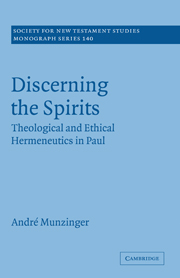Book contents
- Frontmatter
- Contents
- Preface
- Abbreviations
- Part I Introduction
- Part II What Requires Discernment? The Objects of Evaluation
- 2 The Discernment of Ethical Questions
- 3 The Discernment of Spirits
- 4 Discerning All Things: The Structure of Paul's Epistemology
- Part III How Can and Should True Discernment Take Place?
- Part IV Conclusion
- Bibliography
- Author Index
- Passage Index
- Subject Index
2 - The Discernment of Ethical Questions
Published online by Cambridge University Press: 26 October 2009
- Frontmatter
- Contents
- Preface
- Abbreviations
- Part I Introduction
- Part II What Requires Discernment? The Objects of Evaluation
- 2 The Discernment of Ethical Questions
- 3 The Discernment of Spirits
- 4 Discerning All Things: The Structure of Paul's Epistemology
- Part III How Can and Should True Discernment Take Place?
- Part IV Conclusion
- Bibliography
- Author Index
- Passage Index
- Subject Index
Summary
Introduction
I appeal to you therefore, brothers and sisters, by the mercies of God, to present your bodies as a living sacrifice, holy and acceptable to God, which is your spiritual worship. Do not be conformed to this world, but be transformed by the renewing of your minds, so that you may discern [δοκιμάζω] what is the will of God – what is good and acceptable and perfect.
Paul's admonition in Rom. 12.1–2, which is full of hope, is remarkable: after questioning the possibility of understanding God's paths and judgements in Rom. 11.33f., he now presents an approach to the knowledge of the will of God. The prospect of attaining this knowledge was not only a ‘determining factor in Paul's own life and plans’ but to ‘live in tune with the divine, however conceptualized, was also a fundamental objective for all religious and quasi-religious systems of the age’. Now, Paul posits, believers can fulfil this hope. The ethical implications of this vision inspired O. Cullmann to a keen statement of his own:
This ‘testing’ (δοκιμάζειν) is the key to all New Testament ethics … Certainty of moral judgement in the concrete sense is in the last analysis the one great fruit that the Holy Spirit, this factor in redemptive history, produces in the individual man.
Is this a correct interpretation of Paul's thought? If so, it means I need to offer an in-depth study of this ‘testing’.
- Type
- Chapter
- Information
- Discerning the SpiritsTheological and Ethical Hermeneutics in Paul, pp. 21 - 44Publisher: Cambridge University PressPrint publication year: 2007



